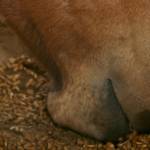What to Expect When Working with an Equine Nutritionist

An equine nutritionist provides educated insight into the management of breeding and performance horses. Many breeding farms have a nutritionist on-call to solve growth-related issues in young horses and to defeat the battle of the bulge among broodmares. Likewise, most high-performance equestrians enlist an expert to fine-tune diets for horses in their care and to troubleshoot any number of feed-related problems that might crop up, from metabolic mayhem such as tying-up to everyday nuisances like inappetence and delicate hooves.
What should a horse owner expect from an equine nutritionist? Simply put: know-how and understanding.
Know-how. Equine nutritionists should, above all else, be well-versed in both the traditions of horse feeding and current nutrition trends, including a thorough grasp of the equine gastrointestinal tract and appropriate management strategies for all types of horses.
Every so often a horse owner will bemoan an impending visit from a feed company’s “nutritionist” because of the inevitable sales pitch. Keep this in mind: a nutritionist is not a professional salesperson; rather, a nutritionist is a consultant trained to quickly, yet thoroughly, assess a situation and provide clear, practical solutions. This is not to say, however, that an equine nutritionist will not identify a problem and then specify action by recommending a product or products known to be effective.
Hundreds of horse owners contact Kentucky Equine Research (KER) each year for nutritional advice for their horses, whether they’re grade horses engaged in pleasure riding or Warmbloods involved in Olympic sports.
“When I receive a question from a horse owner, my primary responsibility lies with the horse’s nutritional well-being,” said Kathleen Crandell, Ph.D., a nutritionist with KER since 1997. “So many of my consultations—whether they occur face to face, phone to phone, or device to device—end with dietary tweaks, not major overhauls. These requests are straightforward and easily handled. More complicated requests require some back and forth with horse owners, and sometimes hours of research, but I am always ready to see the problem to the end.”
Crandell continued, “It is quite satisfying to receive a note of appreciation for my time, and more importantly, a follow-up on the horse’s condition. Unfortunately, you wouldn’t believe how many times I don’t receive any acknowledgement that the advice was received or appreciated, which is sometimes disheartening.”
If you’re unsure how to tell if an equine nutritionist is up-to-date with trends, don’t be afraid to ask about educational history, work experience, or current employment. Advanced education with an emphasis on equine nutrition, such as a master’s degree or a doctorate, and day-to-day work in the field usually indicates a high degree of interest, especially if a nutritionist regularly offers up ideas or products new to the industry.
Understanding. Much of the work of an equine nutritionist depends on a well-tuned ear, explained Catherine Whitehouse, M.S., a nutrition advisor for KER. “Without question, the art of listening must be finely honed. Horse owners love to talk about their horses, and in discussing a problem will often volunteer important points about a particular horse’s management,” she continued. “All of these points—no matter how minute—may come into play later, as a solution begins to form.”
The concept of understanding extends beyond a penchant for paying attention. Not all horse owners live in areas where the finest feeds are available. “Because the nutrition advisors at KER attend to the needs of horse owners from six continents, we often must deal with limited choices in terms of available feeds and feedstuffs,” explained Whitehouse. Due to the wide spectrum of forages and cereal grains appropriate for horses, this is not a problem, according to Whitehouse, but it does require a broad understanding of feeding practices worldwide.
“At KER, we are extremely fortunate because not only do we have nutritionists and nutrition advisors familiar with American feeding systems, we also have a sizeable presence in Australia, Asia, Europe, and South America. Diversity among the KER employees has been advantageous on many levels but particularly so for those horses that travel often for breeding, showing, and exhibition commitments,” said Crandell. “We can recommend high-quality nutrition programs for horses of all types, no matter where they might be and how long they might be there.”
A final point of understanding involves looking out for the horse owner’s feed costs, principally by recommending sufficient feed and supplements to fuel body maintenance and work without costly add-ons. Keeping feeding costs to a minimum, while maintaining excellence, is just one way a nutritionist helps watch the bottom line.
Wondering which feed or supplements are right for your horse? Use the MicroSteed Ration Wizard or share a few details and a KER nutrition advisor will be in touch.








